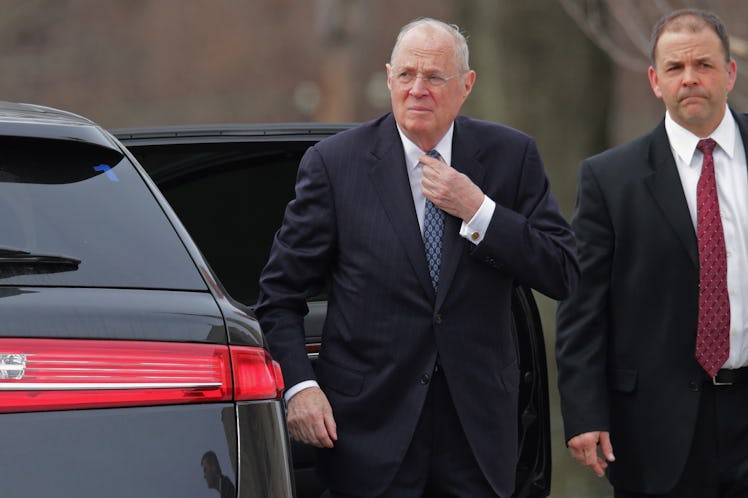
A Supreme Court Justice Is Retiring From The Court, Which Will Have Major Implication On The Law
The news just keeps coming today — especially with respect to the Supreme Court. Justice Anthony Kennedy is retiring from the Supreme Court in a shocking announcement, according to The Associated Press. The news of his retirement throws the ball to President Donald Trump, who will get to appoint the second Supreme Court Justice of his term so far.
Kennedy advised his colleagues on Wednesday, June 27, that he would resign as of July 31.
“It has been the greatest honor and privilege to serve our nation in the federal judiciary for 43 years, 30 of those years on the Supreme Court," Kennedy said.
According to a Supreme Court news release, Kennedy's family was willing for him to continue to serve, but he wanted to spend more time with them. He said, too, that admiration for his colleagues on the court means that he will retain warm ties with each of them in the years to come.
Kennedy was nominated by President Ronald Reagan and took his oath of office on Feb. 18, 1988. Major rulings that he authored or co-authored the court's opinion for include Boumediene v. Bush in 2008, Citizens United v. FEC in 2010, Obergefell v. Hodges in 2015 — which legalized same-sex marriage — and Planned Parenthood v. Casey in 1992 — which upheld the 1973 abortion ruling on Roe v. Wade.
Kennedy was appointed by Reagan, a Republican, but he's famous for being difficult to pin down ideologically. His departure will certainly rattle the nation, as it will likely shift the Supreme Court even further in alignment with the Republican party under Trump. As Vox outlined ahead of the news of Kennedy's departure, a new Supreme Court with an appointee by Trump would be much more likely to overturn Roe V. Wade, which would clear the way for either the federal or state governments (or both) to ban abortion. Among other things that are more at risk, per Vox, are decisions in favor of capital punishment and/or solitary confinement, pro-religious challenges to anti-discrimination laws (possibly putting some past rulings on gay rights at risk), and bans on affirmative action.
It's a horrifying thought experiment that came as the final Supreme Court decisions of the year rolled out this week and early in the morning on Wednesday, June 27. The Hill reported earlier on Wednesday that no retirements were handed down as the court's session came to a close, just hours before news of Kennedy's retirement broke.
U.C. Berkeley law dean and constitutional law expert Erwin Chemerinsky wrote in 2016 that if Kennedy or one of the judges appointed by a Democratic president left, “there almost certainly will be a majority to overrule Roe v. Wade and allow states to prohibit abortions.”
The White House released a statement Wednesday that thanked Kennedy for his service.
"A Californian — like the President who appointed him — Justice Kennedy is a true man of letters," the statement said. "During his tenure on the Court, he authored landmark opinions in every significant area of constitutional law, most notably on equal protection under the law, the separation of powers, and the First Amendment’s guarantees of freedom of speech and religion."
Trump's first appointee, Justice Neil Gorsuch, came to the bench after Senate Majority Leader Mitch McConnell blocked President Barack Obama's nominee, Merrick Garland. (Garland was nominated after Antonin Scalia's death in February 2016). Within an hour after Justice Antonin Scalia died in February 2016, McConnell announced that he would block any Obama replacement, according to The Huffington Post.
“The American people should have a voice in the selection of their next Supreme Court Justice,” McConnell's 2016 statement read. “Therefore, this vacancy should not be filled until we have a new President.”
The Associated Press reported Wednesday that McConnell said his chamber will vote in the fall on Trump’s nominee. “It’s imperative that the president’s nominee be considered fairly and not subjected to personal attacks," McConnell said.
People are going to be talking about the news today for many, many months. It will likely draw more protests, more unrest, and more organizing as the November elections approach.